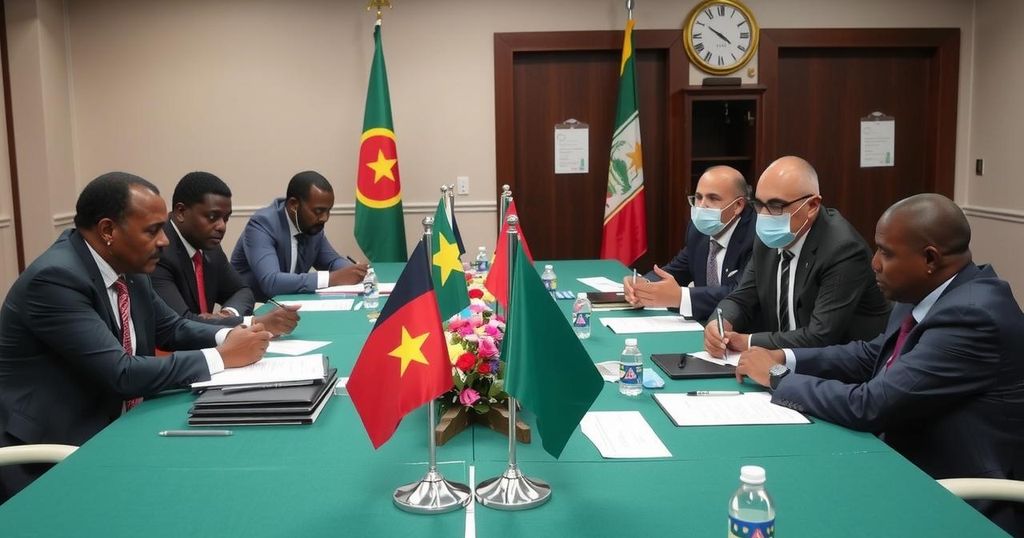Somalia’s Minister of Foreign Affairs, Ali Omar, visited Addis Ababa to reinforce commitments from the Ankara Agreement signed by Ethiopia and Somalia. This agreement aims to foster peace, cooperation, and maritime access for Ethiopia. The meeting highlights a commitment to enhancing bilateral relations, moving beyond past conflicts, and establishing a framework for future regional cooperation guided by mutual respect.
A delegation led by Ali Omar, Somalia’s Minister of Foreign Affairs and International Cooperation, arrived in Addis Ababa on December 14, 2017, to reaffirm commitments outlined in the historic Ankara Agreement. The Ministry of Foreign Affairs of Somalia emphasized their dedication to strengthening bilateral relations with Ethiopia, as agreed upon in discussions under Turkish President Recep Tayyip Erdoğan’s auspices.
The Ankara Agreement, signed on December 2, 2017, between Ethiopian Prime Minister Abiy Ahmed and Somali President Hassan Sheikh Mohamud, is recognized as a significant effort toward peace and cooperation within the Horn of Africa. President Erdoğan referred to the agreement as “historic,” expressing optimism that it would foster regional stability and collaboration.
This agreement facilitates Ethiopia’s need for access to a reliable maritime passage under Somalia’s sovereign authority, a crucial development for Ethiopia’s economic interests, being a landlocked nation. Prime Minister Abiy Ahmed reassured that Ethiopia seeks to pursue a peaceful method for gaining this access, stating, “Ethiopia’s desire to have a sea passage is a peaceful endeavor that benefits our neighbors as well.”
The delegation’s visit reflects ongoing efforts to enhance cooperation between Ethiopia and Somalia, signifying a shift towards constructive dialogue, mutual respect, and shared interests. This collaborative spirit marks a willingness to resolve disputes amicably, moving beyond previous tensions associated with Ethiopia’s relationship with Somaliland.
The key provisions of the Ankara Agreement include respect for each other’s sovereignty and territorial integrity, embracing a constructive partnership, acknowledgment of sacrifices made by Ethiopian soldiers assisting under the African Union mission, assurance of maritime access under Somalia’s authority, and a commitment to technical negotiations facilitated by Turkey, concluding within four months. Further, the agreement encompasses a formal acceptance of Turkey’s role in mediating disputes.
Furthermore, the international community’s interest in the Horn of Africa’s stability is underscored by support from leaders like French President Emmanuel Macron, who endorsed Ethiopia’s maritime aspirations, emphasizing dialogue and international law compliance. The implications of a successful Ankara Agreement could serve as a model for resolving regional conflicts and reinforcing economic collaboration, indicating a potential new chapter for Ethiopia and Somalia.
Through effective dialogue and adherence to mutual benefit, both nations are expected to strengthen ties not only with each other but also within the broader region, fostering peace and shared prosperity throughout the Horn of Africa.
The visit of the Somali delegation to Addis Ababa is rooted in the Ankara Agreement, a pivotal accord aimed at enhancing peace and cooperation between Somalia and Ethiopia. Signed on December 2, 2017, this agreement is crucial for Ethiopia’s efforts to establish a maritime route, vital for its trade and economic development. The ongoing discussions and collaborations underline a significant shift towards constructive relations, shifting focus from historical tensions to shared objectives in the region.
In summary, the visit by the Somali delegation signifies a commitment to the Ankara Agreement and a dedication to improving bilateral relations between Somalia and Ethiopia. Both nations are taking vital steps toward addressing past disputes and prioritizing peaceful cooperation. The successful implementation of the Ankara Agreement may pave the way for broader stability and economic collaboration within the Horn of Africa, reflecting a promising future for regional relations and peace.
Original Source: addisinsight.net







